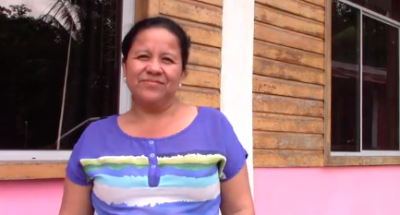Indigenous People and Justice in Nicaragua’s North Caribbean Coast
Interview with Dr. Loyda del Carmen Martínez Rodríguez, Sole Local Judicial Authority for the Municipality of Waspam, Rio Coco, RACCN

All Global Research articles can be read in 27 languages by activating the “Translate Website” drop down menu on the top banner of our home page (Desktop version).
***
Tortilla con Sal: Perhaps compañera, you could identify yourself and explain to us about the property remediation process and about cases you have adjudicated.
Dr. Loyda Martínez Rodríguez: Ok. My name is Loyda del Carmen Martínez Rodríguez, and I am the Single Local Judge for the municipality of Waspam, Rio Coco. We have prosecuted six cases of usurpation of communal domain of indigenous peoples, where people who are not natives of that community have come to misappropriate land of indigenous peoples. So, how has this procedure been carried out? In the territories, the owners of the land, who are the presidents of the territorial governments, file a complaint with the National Police. The National Police receives these and does all the investigative work. Then they refer the cases to the Public Prosecutor’s Office, and the Public Prosecutor’s Office files the accusation before the Single Local Court. We have sentenced these people with the maximum penalty of 3 years, and have thus sent them to the penitentiary in Managua or Matagalpa.
Also, I have participated in dialogue between mestizos and Miskitos in which there are territories that want to resolve the remediation process by means of a leasing agreement with the territory. They make the proposal, then the territory, its president will decide if they are going to lease or not. So, we have carried out these procedures as a judicial authority… by way of accompaniment, then. So you see, we heve participated listening to both parties, the mayor of the municipality has invited me to participate and listen to proposals made by the non-indigenous party.
The State has vindicated the indigenous and Afro-descendant peoples’ right to the land, and the State is also a guarantor in the efforts to secure social peace in our country and in our region. It is a process in which the State has guaranteed and has given those peoples this right, but the political opposition always does not see this. They also say that the cases we have prosecuted are of little importance. But no. The indigenous peoples are being protected and the rights the indigenous peoples are being vindicated. And the State has contributed a great deal to this because no other government had ever recognized the indigenous peoples, giving them a title to what before was only private property, where only the oligarchy and the bourgeoisie had the right to own land.
But now the State has guaranteed, has extended that legal protection by which the people of the Caribbean Coast have received the title to their land. And not only the title. You can go to the community and see how they have advanced significantly. They have their land, their crops and much more. It is the State has guaranteed that these peoples have their land in legal terms, namely the title to their property.
Likewise, we have made progress in this aspect of property remediation, and we are not trying to drag it out, although the opposition always sees it like that. But there has been a lot of progress, because there is a dialogue between mestizos and Miskitos in which the State guarantees as established in Law 445 that those communities, that now have their legal title, can lease their land and that is allowed by law. But this is something that as regards the State and the territories, each territory president is able say whether they want to lease or not.
TcS: What’s the relationship between the justice administered by the State, which you represent, and the justice of the indigenous peoples, which is represented at the community level by their wihsta?
Loyda: You see, the State allows positive law and customary law, for the State there are the local judges, the district judges and iIn the case of customary law there are the wihstas, the original community authorities. Today in the Political Constitution and the reforms to it, the wihstasare recognized as the original community authorities of the indigenous and Afro-descendant peoples, with which the State interacts, as in Article 20 of Nicaragua’s Penal Code, and as is also recognized in the Political Constitution. So, what do we do in that regard? We work together. We constantly train our wihstas in new legislation, and how those laws should be administered in their community.
And the law also establishes that they can mediate, and that mediation can be done via the Single Local Court which registers how citizens choose the form of justice they prefer. They can choose the positive justice that we represent or they can choose customary justice. So the citizen chooses one or other of those two forms of justice. Then, as long as it’s in accordance with the law… they administer justice. So then, what do we do? In those cases that can be resolved amicably without the need to go to court, we write the resulting mediation in the mediation register that we have kept for many years. So that means there is access to justice, and for reasons of cost, or distance, people are able to choose their form of justice in their community, which we recognize and we respect the work of our traditional authorities, namely, the wihstas.
*
Note to readers: please click the share buttons above or below. Forward this article to your email lists. Crosspost on your blog site, internet forums. etc.
This article was originally published on Tortilla con Sal.

